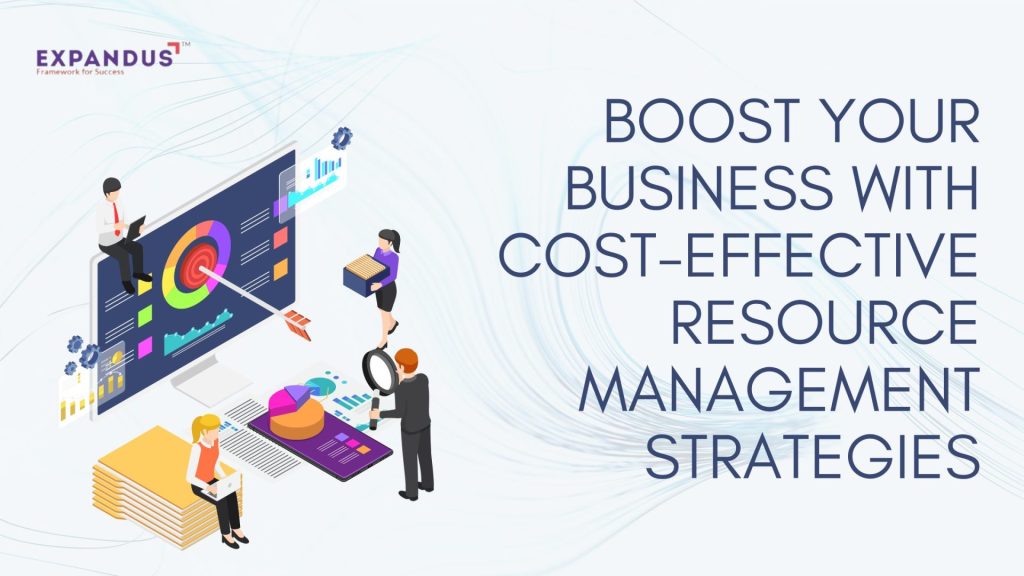Boost Your Business with Cost-Effective Resource Management Strategies
When a business manages its resources well, it can make clients happy. This means they get what they need on time and they’re satisfied. Happy clients are more likely to come back and tell others about the business. But if resources aren’t managed properly, it can make employees feel really stressed and tired. However, when resources are used wisely, employees feel good about their work. They feel like they matter and can do their job well. This can make them happier and more likely to stay with the company. We’re going to talk about some easy ways to manage your resources so you can save money and do things faster. These strategies will boost your business with cost-effective resource management. Let’s get started. Get ready to make your business even better with Cost-Effective Resource Management!!
Understanding Resource Management
To manage resources well, you need to match them with what you want to do. This means knowing exactly what you want to achieve and telling your team about it. You also need to figure out what resources you have and what you’ll need in the future. Then, you use these resources for the most important tasks, so you don’t waste anything. Lets take a closure look into cost-effective resource management.
Defining resource management in the context of business
Resource management in business is about how a company uses different things to reach its goals. These things can be money, time, people, equipment, materials, and knowledge or skills.
Cost-effective resource management means using things wisely to save money and still do well. It’s about using money, time, people, and equipment in the best ways possible so nothing goes to waste. To manage resources cost-effectively, you need to make smart choices about spending money, using time wisely, getting the most from your team, and keeping equipment in good condition. When businesses manage their resources in a cost-effective way, they can save money, work better, and reach their goals without spending too much.
In short, managing resources well is super important for businesses to work well, spend less money, and reach their goals. It means planning carefully and keeping an eye on everything to make sure it’s all used in the best way possible.
The types of resources with their importance
Let’s delve into the different types of resources and why they’re important for businesses:
- Human Resources: This means the people who work for a company, like the employees, bosses, and team leaders. They’re super important because they come up with new ideas, help customers, and do the work that keeps the company going. Without good workers, a company might have trouble doing well in the market.
- Financial Resources: This is all about the money a company has for buying things, growing the business, and paying bills. It’s really important because it lets the company buy stuff, invest in new ideas, and cover costs. Managing money well means making plans for spending, predicting what might happen, and making smart decisions to keep the company’s money healthy.
- Physical Resources: These are the things you can touch, like buildings, machines, and stuff in storage. They’re key for companies that make things or offer services. Physical resources help companies make products, store stuff, and run their places. Keeping them in good shape means fixing things up, taking care of them, and making them work better and last longer.
- Digital Resources: This is all about computers, software, data, and the internet that help businesses run smoothly. In today’s world, these are super important for companies to stay ahead and make customers happy. Digital resources help companies do things faster, talk better, understand data, and reach out to customers online. Managing them means spending money on good tech, keeping things safe online, and using the internet to get more customers.
All these resources are really important for a business to do well. If a company manages its people, money, stuff, and tech well, it can do its best work, reach its goals, and stay ahead of the competition.
Common challenges businesses face in resource management
Businesses often face many problems when trying to manage their resources well. Here are some common ones:
- Limited Budgets: Many businesses operate with limited financial resources, which can make it challenging to allocate funds for various needs. This can make it hard to buy new technology, train employees, or fix equipment when needed.
- Not Enough Time: Time is important, but businesses sometimes struggle to manage it. They might have too many things to do at once, tight deadlines, or unexpected delays that make it hard to finish tasks on time.
- Not Enough Skilled team: Finding and keeping skilled workers can be hard. This is especially true in industries where talented people are in high demand. Not having enough skilled workers can slow down work and cost a lot of money to hire and train new employees.
- Things Don’t Work Well: Sometimes, the way a business does things isn’t efficient. This can waste time and money. Problems like too many steps to complete a task, doing things by hand when they could be done by a machine, or having to redo work because it wasn’t done right the first time can all cause inefficiencies.
- Problems with Communication: When teams or departments don’t talk to each other well, it can lead to misunderstandings, delays, and mistakes. Not communicating properly can also mean that people are working on the wrong things or doing the same work twice.
- Not Enough Planning: Businesses need to have a clear plan for what they want to achieve. Without a plan, it’s hard to know what’s important, what needs to be done first, and how resources should be used.
- Technology Issues: Using technology can help businesses work better, but sometimes there are problems. Things like computer glitches, software that doesn’t work right, or employees who don’t want to learn new technology can all cause issues.
- Outside Problems: Sometimes, things happen outside of a business’s control that can affect how resources are managed. This could be things like the economy getting worse, new rules and regulations, or changes in what customers want.
To fix these problems, businesses need to plan ahead, talk to each other, find better ways to do things, and be ready to deal with unexpected challenges. By doing this, they can use their resources better and be more successful.
Top Benefits of Cost-Effective Resource Management
Here are some resource management benefits & why it’s important to manage resources well:
Improved profitability through optimized resource allocation
When a business manages its resources well, it can make more money. This means using money, time, and people wisely. For example, if a company only spends money on things that help it grow and make more money, it can earn more in the end.
Better scalability and flexibility in operations
Being able to grow or shrink easily is called scalability. So, if a business manages its resources well, it can adapt to changes. For instance, if they suddenly need to make more products, they can do it without any problems.
Enhanced efficiency and productivity
Doing things faster and better is called efficiency and productivity. When a business manages its resources effectively, it can get things done quicker and with higher quality. For example, if they have enough people and tools to do a job, they can finish it faster and do it well.
Increased competitiveness by leveraging resources wisely
Being competitive means being better than other similar businesses. When a company uses its resources wisely, it can stand out from the competition. For example, if they use their money and people in smart ways, they can offer better products or services than their rivals.
So, there are several resource management benefits. when a business manages its resources well, it can earn more money, adapt to changes easily, work faster and better, and be better than its competitors.
5 Strategies for Cost-Effective Resource Management
Here are some strategies for cost-effective resource management in your organization:-
Leveraging Technology
This means using computers, software, and machines to help you do your work better and faster. For example, using a computer program to keep track of your inventory instead of writing it down by hand. Technology can make things easier and save time and money.
Outsourcing Non-Core Activities
Sometimes, there are tasks in your business that you don’t have to do yourself. You can hire another company to do them for you. For example, if you have a restaurant, you might hire a cleaning company to clean the restaurant instead of doing it yourself. This way, you can focus on talent management plan, and the other company can do what they’re good at.
Employee Training and Development
This means teaching your employees new things so they can do their jobs even better. It could be sending them to classes or workshops, or even just showing them new ways to do things. When employees know more, they can work more efficiently and do a better job.
Implementing Lean Principles
“Lean” means getting rid of things that waste time or money. It’s about doing things in the simplest and most efficient way possible. For example, if you have a factory, you might try to organize things so that your workers don’t have to walk as far to get the materials they need. This saves time and makes things run smoother.
Regular Review and Adjustment
This means checking on how things are going in your business regularly and making changes when needed. You might look at your budget every month to see if you’re spending too much money in one area and not enough in another. Or you might talk to your employees to see a better way to do things. By reviewing and adjusting, you can keep your business running smoothly. Further, you can make sure you’re using the talent management plan in the best way.
Managing resources well is really important for you to do well in today’s competitive world. One big part of managing resources is making sure they’re used in a way that saves money and doesn’t waste anything. If you want to get help in resource management, schedule a demo with our expert.
Wrapping It Up
To sum up, using smart ways to manage resources isn’t just a good idea. It’s super important for making your business grow and do well. By using technology, getting help for tasks you don’t need to do yourself, training your team, making things simpler, and always checking how you’re using your resources, businesses can work better, save time, and make more money. Even though there might be tough times, planning ahead, talking well, and getting better all the time are the keys to solving problems and making the most out of what you have. Paying attention to managing resources well can help businesses find new chances, become stronger against others, and move ahead in the business world.
At Expand Us Business Coaching Services, we provide valuable guidance and tips to help you excel in business. Book a demo with us today and start your journey towards success!









